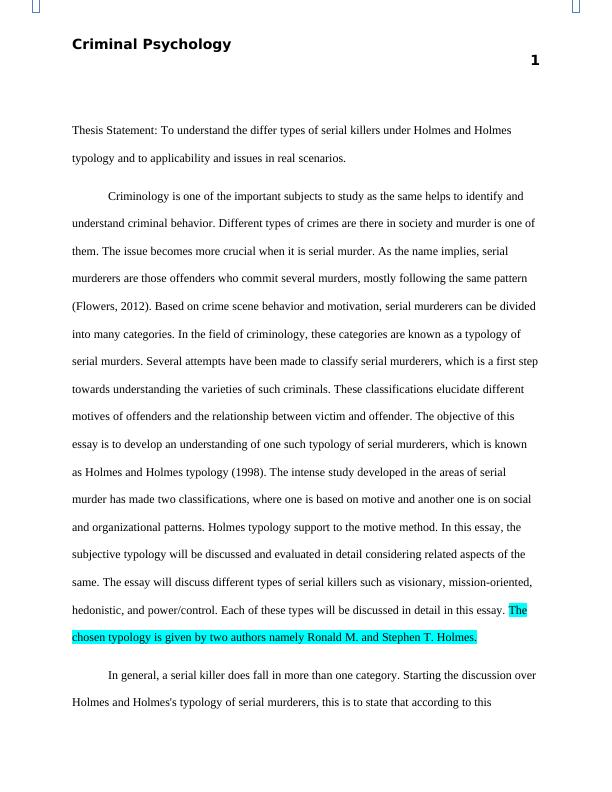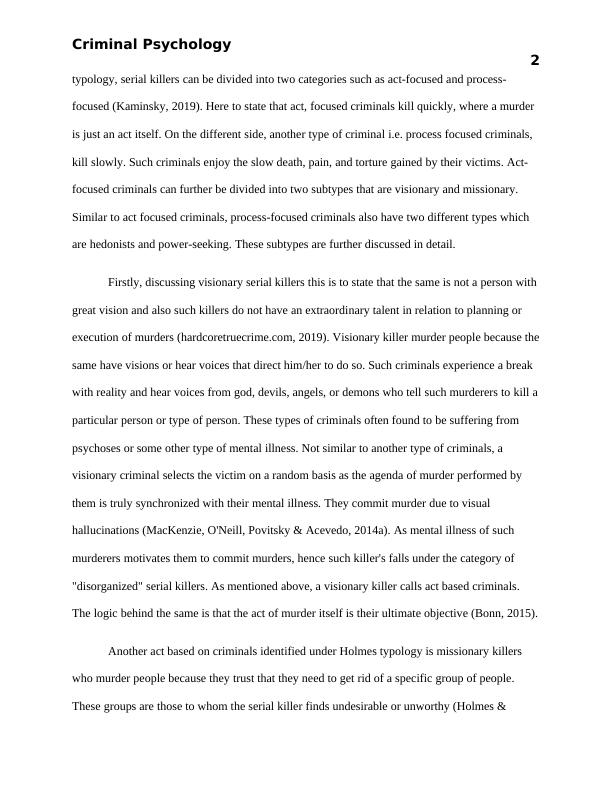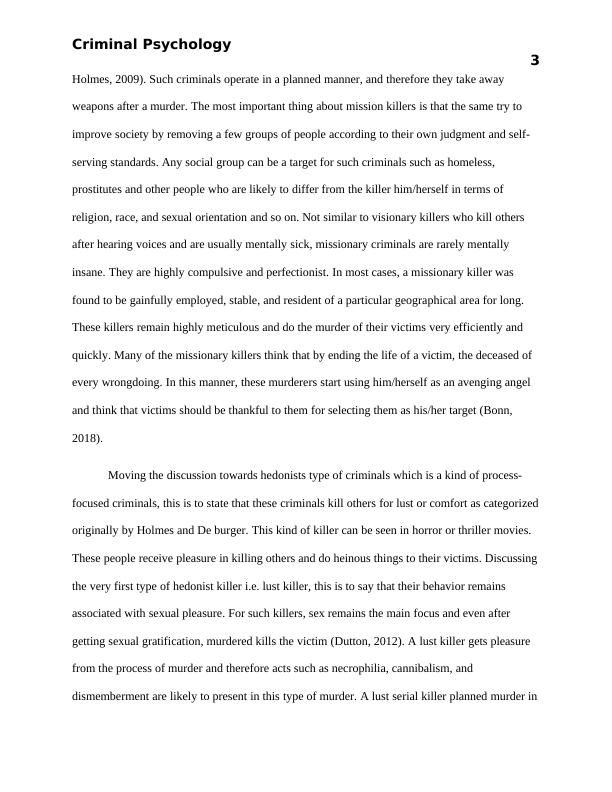Holmes and Holmes Typology
Added on 2022-09-07
11 Pages3054 Words23 Views
Running Head: BUSINESS AND CORPORATION LAW 0
Criminal Psychology
7/12/2018
Student’s Name
Criminal Psychology
7/12/2018
Student’s Name

Criminal Psychology
1
Thesis Statement: To understand the differ types of serial killers under Holmes and Holmes
typology and to applicability and issues in real scenarios.
Criminology is one of the important subjects to study as the same helps to identify and
understand criminal behavior. Different types of crimes are there in society and murder is one of
them. The issue becomes more crucial when it is serial murder. As the name implies, serial
murderers are those offenders who commit several murders, mostly following the same pattern
(Flowers, 2012). Based on crime scene behavior and motivation, serial murderers can be divided
into many categories. In the field of criminology, these categories are known as a typology of
serial murders. Several attempts have been made to classify serial murderers, which is a first step
towards understanding the varieties of such criminals. These classifications elucidate different
motives of offenders and the relationship between victim and offender. The objective of this
essay is to develop an understanding of one such typology of serial murderers, which is known
as Holmes and Holmes typology (1998). The intense study developed in the areas of serial
murder has made two classifications, where one is based on motive and another one is on social
and organizational patterns. Holmes typology support to the motive method. In this essay, the
subjective typology will be discussed and evaluated in detail considering related aspects of the
same. The essay will discuss different types of serial killers such as visionary, mission-oriented,
hedonistic, and power/control. Each of these types will be discussed in detail in this essay. The
chosen typology is given by two authors namely Ronald M. and Stephen T. Holmes.
In general, a serial killer does fall in more than one category. Starting the discussion over
Holmes and Holmes's typology of serial murderers, this is to state that according to this
1
Thesis Statement: To understand the differ types of serial killers under Holmes and Holmes
typology and to applicability and issues in real scenarios.
Criminology is one of the important subjects to study as the same helps to identify and
understand criminal behavior. Different types of crimes are there in society and murder is one of
them. The issue becomes more crucial when it is serial murder. As the name implies, serial
murderers are those offenders who commit several murders, mostly following the same pattern
(Flowers, 2012). Based on crime scene behavior and motivation, serial murderers can be divided
into many categories. In the field of criminology, these categories are known as a typology of
serial murders. Several attempts have been made to classify serial murderers, which is a first step
towards understanding the varieties of such criminals. These classifications elucidate different
motives of offenders and the relationship between victim and offender. The objective of this
essay is to develop an understanding of one such typology of serial murderers, which is known
as Holmes and Holmes typology (1998). The intense study developed in the areas of serial
murder has made two classifications, where one is based on motive and another one is on social
and organizational patterns. Holmes typology support to the motive method. In this essay, the
subjective typology will be discussed and evaluated in detail considering related aspects of the
same. The essay will discuss different types of serial killers such as visionary, mission-oriented,
hedonistic, and power/control. Each of these types will be discussed in detail in this essay. The
chosen typology is given by two authors namely Ronald M. and Stephen T. Holmes.
In general, a serial killer does fall in more than one category. Starting the discussion over
Holmes and Holmes's typology of serial murderers, this is to state that according to this

Criminal Psychology
2
typology, serial killers can be divided into two categories such as act-focused and process-
focused (Kaminsky, 2019). Here to state that act, focused criminals kill quickly, where a murder
is just an act itself. On the different side, another type of criminal i.e. process focused criminals,
kill slowly. Such criminals enjoy the slow death, pain, and torture gained by their victims. Act-
focused criminals can further be divided into two subtypes that are visionary and missionary.
Similar to act focused criminals, process-focused criminals also have two different types which
are hedonists and power-seeking. These subtypes are further discussed in detail.
Firstly, discussing visionary serial killers this is to state that the same is not a person with
great vision and also such killers do not have an extraordinary talent in relation to planning or
execution of murders (hardcoretruecrime.com, 2019). Visionary killer murder people because the
same have visions or hear voices that direct him/her to do so. Such criminals experience a break
with reality and hear voices from god, devils, angels, or demons who tell such murderers to kill a
particular person or type of person. These types of criminals often found to be suffering from
psychoses or some other type of mental illness. Not similar to another type of criminals, a
visionary criminal selects the victim on a random basis as the agenda of murder performed by
them is truly synchronized with their mental illness. They commit murder due to visual
hallucinations (MacKenzie, O'Neill, Povitsky & Acevedo, 2014a). As mental illness of such
murderers motivates them to commit murders, hence such killer's falls under the category of
"disorganized" serial killers. As mentioned above, a visionary killer calls act based criminals.
The logic behind the same is that the act of murder itself is their ultimate objective (Bonn, 2015).
Another act based on criminals identified under Holmes typology is missionary killers
who murder people because they trust that they need to get rid of a specific group of people.
These groups are those to whom the serial killer finds undesirable or unworthy (Holmes &
2
typology, serial killers can be divided into two categories such as act-focused and process-
focused (Kaminsky, 2019). Here to state that act, focused criminals kill quickly, where a murder
is just an act itself. On the different side, another type of criminal i.e. process focused criminals,
kill slowly. Such criminals enjoy the slow death, pain, and torture gained by their victims. Act-
focused criminals can further be divided into two subtypes that are visionary and missionary.
Similar to act focused criminals, process-focused criminals also have two different types which
are hedonists and power-seeking. These subtypes are further discussed in detail.
Firstly, discussing visionary serial killers this is to state that the same is not a person with
great vision and also such killers do not have an extraordinary talent in relation to planning or
execution of murders (hardcoretruecrime.com, 2019). Visionary killer murder people because the
same have visions or hear voices that direct him/her to do so. Such criminals experience a break
with reality and hear voices from god, devils, angels, or demons who tell such murderers to kill a
particular person or type of person. These types of criminals often found to be suffering from
psychoses or some other type of mental illness. Not similar to another type of criminals, a
visionary criminal selects the victim on a random basis as the agenda of murder performed by
them is truly synchronized with their mental illness. They commit murder due to visual
hallucinations (MacKenzie, O'Neill, Povitsky & Acevedo, 2014a). As mental illness of such
murderers motivates them to commit murders, hence such killer's falls under the category of
"disorganized" serial killers. As mentioned above, a visionary killer calls act based criminals.
The logic behind the same is that the act of murder itself is their ultimate objective (Bonn, 2015).
Another act based on criminals identified under Holmes typology is missionary killers
who murder people because they trust that they need to get rid of a specific group of people.
These groups are those to whom the serial killer finds undesirable or unworthy (Holmes &

Criminal Psychology
3
Holmes, 2009). Such criminals operate in a planned manner, and therefore they take away
weapons after a murder. The most important thing about mission killers is that the same try to
improve society by removing a few groups of people according to their own judgment and self-
serving standards. Any social group can be a target for such criminals such as homeless,
prostitutes and other people who are likely to differ from the killer him/herself in terms of
religion, race, and sexual orientation and so on. Not similar to visionary killers who kill others
after hearing voices and are usually mentally sick, missionary criminals are rarely mentally
insane. They are highly compulsive and perfectionist. In most cases, a missionary killer was
found to be gainfully employed, stable, and resident of a particular geographical area for long.
These killers remain highly meticulous and do the murder of their victims very efficiently and
quickly. Many of the missionary killers think that by ending the life of a victim, the deceased of
every wrongdoing. In this manner, these murderers start using him/herself as an avenging angel
and think that victims should be thankful to them for selecting them as his/her target (Bonn,
2018).
Moving the discussion towards hedonists type of criminals which is a kind of process-
focused criminals, this is to state that these criminals kill others for lust or comfort as categorized
originally by Holmes and De burger. This kind of killer can be seen in horror or thriller movies.
These people receive pleasure in killing others and do heinous things to their victims. Discussing
the very first type of hedonist killer i.e. lust killer, this is to say that their behavior remains
associated with sexual pleasure. For such killers, sex remains the main focus and even after
getting sexual gratification, murdered kills the victim (Dutton, 2012). A lust killer gets pleasure
from the process of murder and therefore acts such as necrophilia, cannibalism, and
dismemberment are likely to present in this type of murder. A lust serial killer planned murder in
3
Holmes, 2009). Such criminals operate in a planned manner, and therefore they take away
weapons after a murder. The most important thing about mission killers is that the same try to
improve society by removing a few groups of people according to their own judgment and self-
serving standards. Any social group can be a target for such criminals such as homeless,
prostitutes and other people who are likely to differ from the killer him/herself in terms of
religion, race, and sexual orientation and so on. Not similar to visionary killers who kill others
after hearing voices and are usually mentally sick, missionary criminals are rarely mentally
insane. They are highly compulsive and perfectionist. In most cases, a missionary killer was
found to be gainfully employed, stable, and resident of a particular geographical area for long.
These killers remain highly meticulous and do the murder of their victims very efficiently and
quickly. Many of the missionary killers think that by ending the life of a victim, the deceased of
every wrongdoing. In this manner, these murderers start using him/herself as an avenging angel
and think that victims should be thankful to them for selecting them as his/her target (Bonn,
2018).
Moving the discussion towards hedonists type of criminals which is a kind of process-
focused criminals, this is to state that these criminals kill others for lust or comfort as categorized
originally by Holmes and De burger. This kind of killer can be seen in horror or thriller movies.
These people receive pleasure in killing others and do heinous things to their victims. Discussing
the very first type of hedonist killer i.e. lust killer, this is to say that their behavior remains
associated with sexual pleasure. For such killers, sex remains the main focus and even after
getting sexual gratification, murdered kills the victim (Dutton, 2012). A lust killer gets pleasure
from the process of murder and therefore acts such as necrophilia, cannibalism, and
dismemberment are likely to present in this type of murder. A lust serial killer planned murder in

End of preview
Want to access all the pages? Upload your documents or become a member.
Related Documents
Offender Profiling: Classification and Forms of Crimelg...
|10
|3479
|91
Serial and Mass Murder: Differences and Similaritieslg...
|4
|741
|252
